Natural Resource Damage Assessment & Sustainable Landscapes
The natural environment has exceptional capacity to revitalize and renew. It can come back stronger from large-scale industrial chemical releases, unsustainable farming practices, and even incessant degradation from a changing climate. But communities and key decision makers must have the knowledge and tools for restoration, conservation, and the transition to sustainable practices. That is exactly what Abt delivers to countries, cities, and far-reaching corners of our fragile planet.
Natural Resource Damage Assessment and Restoration Services
Injury to natural resources can occur from a variety of contamination sources, from explosive oil spills to persistent seepage of toxic chemicals. When this occurs, it is important to understand the pathways of exposure and extent of the injury—or harm—caused. It is also imperative to ensure accountability from responsible parties and plan for effective restoration.
For more than 25 years, Abt staff have been leaders and innovators in the natural resources damage assessment (NRDA) field. We have assisted federal, state, and Tribal natural resource agencies—which serve as trustees of natural resources on behalf of the public—with scientific, economic, legal, and strategic support on more than 150 NRDA cases across the U.S. territories, with similar assessments in Canada.
Deepwater Horizon
The Deepwater Horizon (DWH) oil spill in 2010 is the largest in U.S. history, releasing an estimated 134 million gallons of oil into the northern Gulf of Mexico over 87 days. The scale of DWH was unprecedented—it impacted whole ecosystems, habitats, and livelihoods across Alabama, Florida, Louisiana, Mississippi, and Texas. Abt played a key role in supporting natural resource trustees in conducting a NRDA by characterizing exposure to the spilled oil and resulting injuries (.pdf). This support ultimately led to the largest recovery of damages in U.S. history, with up to $8.8 billion dollars to be spent on the restoration of natural resources.
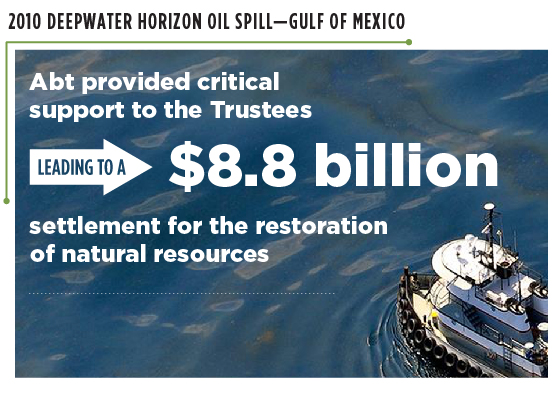
As part of our work, Abt designed, directed, and managed the National Oceanic and Atmospheric Administration’s (NOAA) aquatic toxicity testing program, serving as one of the principal investigators for NOAA as well as for the U.S. Fish and Wildlife Service’s avian toxicity testing program. This work involved 30 principal investigators and organizations who assessed damage to 40 species of fish, invertebrates, reptiles, and birds and completed more than 650 definitive bioassays, down to the molecular effects of oil exposure.
Abt also authored several sections of the DWH Programmatic Damage Assessment and Restoration Plan (PDARP) and the Programmatic Environmental Impact Statement (PEIS). Since 2015, Abt has published over 60 peer-reviewed journal articles on DWH which have been cited nearly 1,000 times. We are currently supporting state and federal trustees in developing restoration plans and other documents stemming from the PDARP/PEIS.


Abt is supporting Louisiana's Coastal Protection and Restoration Authority, under the Deepwater Horizon settlement, in developing the Restoration Plan for one of the largest habitat restoration projects in the country—a $1 billion effort to reconnect the Mississippi River to Barataria Bay. This project aims to rebuild more than 17,000 acres of land and create over 200,000 acres of marsh habitat through the delivery of 200 million metric tons of Mississippi River sediment and freshwater to the Gulf of Mexico—restoring habitat for fish, crustaceans, and other flora and fauna that were affected by the oil spill.
PFAS
Abt supports multiple state trustees that have filed suits against manufacturers and releasers of per- and polyfluorinated alkyl substances (PFAS)—the “forever chemicals” found in Teflon and other products. PFAS is so toxic that the equivalent of just one grain of sand in an Olympic size swimming pool can be associated with cancer, immune system dysfunction, and other significant health concerns. Abt has provided technical support in evaluating PFAS sources and exposure pathways, characterizing harm to groundwater and other natural resources, and assessing public services such as drinking water. We have studied PFAS contamination related to emissions and discharges from manufacturing facilities, leaching from landfills, and the use of aqueous film-forming foams (AFFFs) by firefighters and at military installations.
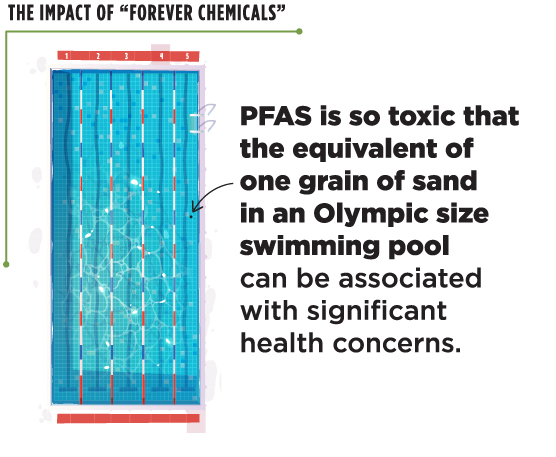
Since 2018, Abt has been working with the Minnesota Pollution Control Agency and the Department of Natural Resources to execute a settlement with the 3M Company regarding contamination of groundwater with PFAS chemicals. Under the settlement, 3M paid $850 million to the state. We are providing a wide range of strategic and analytical support to help the agencies develop a drinking water supply plan. Ultimately, the restoration implemented with the settlement funds will benefit the public by providing improved drinking water delivery systems and other enhancements to the communities that were adversely affected by the contamination of their drinking water supply.

Client
National Oceanic and Atmospheric Administration (NOAA), U.S. Fish and Wildlife Service (USFWS), State of Louisiana
Project
Deepwater Horizon: Natural Resource Damage Assessment Toxicity Testing Program
Client
National Oceanic and Atmospheric Administration (NOAA)
Project
Programmatic Damage Assessment and Restoration Plan (PDARP) and Programmatic Environmental Impact Statement (PEIS)
Client
Louisiana Coastal Protection and Restoration Authority (CPRA)
Project
Mid-Breton and Mid-Barataria Sediment Diversion Restoration Projects
Client
Minnesota Pollution Control Agency
Project
3M PFAS Settlement Support for Programmatic Restoration Planning and Implementation
Advancing U.N. Sustainable Development Goals
[click tab above to open]
Sustainable Landscape Management
On land, in the water, and at the spaces where the two meet, Abt experts work with farmers, resource managers, policy makers, private sector, and others who play a role in sustainable natural resource management.
Driving the Business Case for Sustainability Across Agriculture and Aquatics
Farmers around the world are confronting a changing climate. The prospects of less rain, warmer days, and pest influx are especially daunting for smallholder farmers in low-income countries. Abt’s work helps to address barriers to the adoption of climate-smart practices that unlock superior financial and environmental returns.
In Ghana—the world’s second-largest cacao producer—Abt compared a range of climate-smart production options with business-as-usual farming methods. We found that climate-smart practices, such as planting trees and growing cacao in the shade, not only protected environmental resources and decreased financial risks, but also led to the highest yields and incomes for farmers. The analysis showed clear benefits to farmers, cooperatives, suppliers, and other stakeholders across the value chain.
In Egypt, smallholder farmers have excellent growing conditions and a prime location for exporting high-value crops to markets in Europe and beyond. But logistical challenges and inconsistent and excessive use of pesticides and fertilizers create barriers to broader markets. Abt facilitated a pilot between PepsiCo and 150 potato farmers to help smallholder farmer organizations become more customer-responsive and use sustainable farming practices. In the first season of the pilot, farmers doubled their productivity, increased net income by more than 100 percent, and reduced pesticide and fertilizer use by up to 30 percent. This effort will expand to reach 850 additional farmers in the coming year, assisting them to transition from low-margin traditional crops to higher-value premium horticulture production that meets international environmental standards.
Catalyzing Capital for Women-led Sustainable Agriculture
Women are disproportionately affected by climate change and natural resource depletion. This inequity manifests through a variety of negative effects—from higher mortality during natural disasters to having to travel farther to collect water due to increased drought. The agriculture sector—which is particularly vulnerable to climatic stress—employs one-fourth of all economically active women around the world. Yet due to systemic gender inequities, women have significantly lower access to financial capital and technical training to strengthen climate resilience and adaptation capacity. Through Investing in Women (IW)—an initiative of the Australian Government in Southeast Asia—Abt works with impact investors to leverage private capital and apply a gender lens to investment processes that narrow the financing gap for women-owned and -led small and medium enterprises.
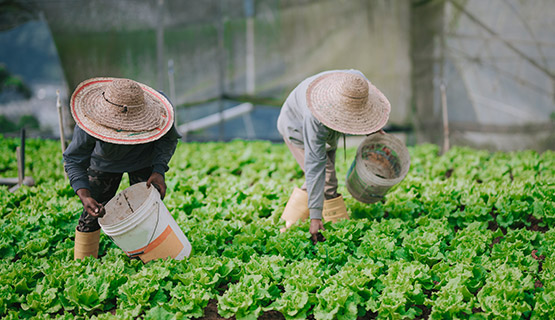
In the Philippines, a women-run co-op that produces and sells bioorganic fertilizers and trades in agricultural inputs, seedlings, and organic livestock was able to construct a new production facility and procure better equipment with their IW investment. This support increased production levels and trading of agricultural inputs to strengthen climate-resilient crops and sustainable agricultural practices that improved local livelihoods. In addition to spurring higher levels of profitability, IW funding for technical assistance has enabled the co-op to increase its operational efficiency and responsiveness to its smallholder farmer members and other clients.
A women-led business in Indonesia turns sustainably sourced coconuts from smallholder farmers into high-quality organic virgin coconut oil and other organic coconut-based products for domestic and international markets. Through IW, the firm was able to expand their production capacity, creating a sustainable and organic value chain that boosts livelihoods for local communities and women. The funding has also enabled the firm to improve skills in organic cultivation of natural resources and establish a strategy to adopt a zero-waste production model—channeling waste products from production into value-added products such as coconut flour.
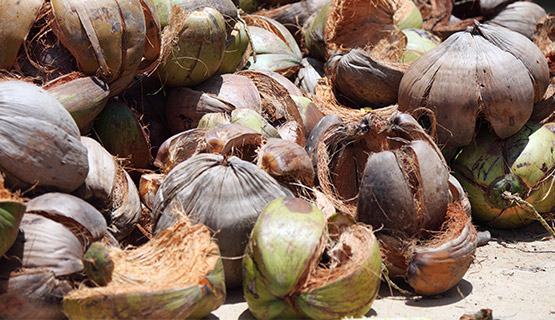
Client: Australian Government Department of Foreign Affairs and Trade (DFAT)
Project: Investing in Women (IW)
In Mozambique, overdevelopment has destroyed coastal mangroves, which are globally important ecosystems that provide fishery habitats, serve as natural coastal protection from erosion, flooding, and related damages caused by storm surges, and sequester carbon. Ironically, earthen dikes—temporary berms made of soil—have been constructed in their place. Abt conducted a cost-benefit analysis to quantify and compare investments in mangrove restoration to earthen dikes. Taking into account economic activities, such as fishing and carbon sequestration, Abt’s results show that mangrove restoration provides the greatest financial and economic benefits—and is the only solution to provide protection from high-severity storms.
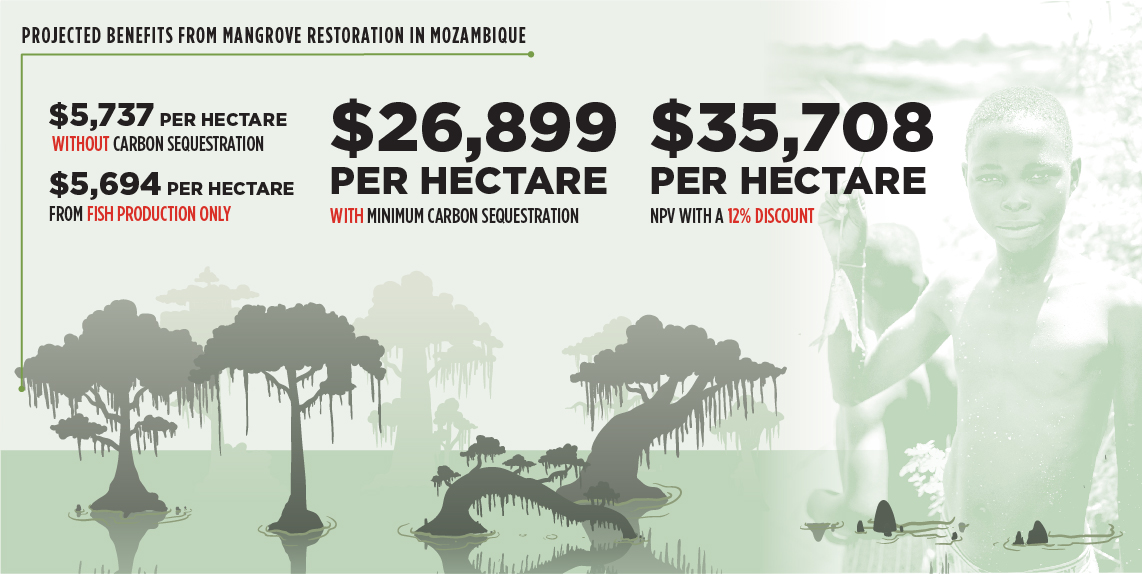
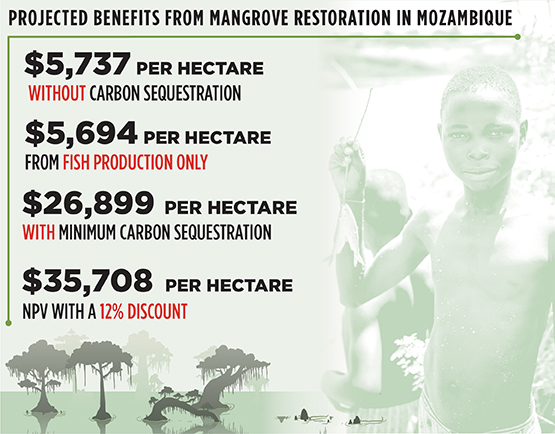
Effective conservation efforts need funding, and gauging constituents’ willingness to pay for environmental conservation is a key input to public policy and programmatic design. Florida’s coral reef ecosystem is the largest in the continental U.S. and extremely sensitive to human-caused disruption and climate change. To better understand residents’ knowledge of—and willingness to protect—the coral, Abt conducted a social survey, collecting data on a suite of socioeconomic variables from seafood consumption to support for or opposition to strategies to protect coral reefs. One of the most interesting findings was that a tax of only $10 per year to protect coral reefs garnered overwhelming support (81 percent) among South Florida residents, with a majority of them continuing to support a tax up to $500 per year.

Client
U.S. Agency for International Development (USAID)
Projects
Climate Economic Analysis for Development, Investment and Resilience (CEADIR); Egypt Rural Agribusiness (ERAS) Project
Client
National Oceanic and Atmospheric Administration (NOAA)
Project
South Florida Residents’ Knowledge of, Attitudes Toward, and Perceptions of Coral Reefs and Coral Reef Management
Advancing U.N. Sustainable Development Goals
[click tab above to open]
